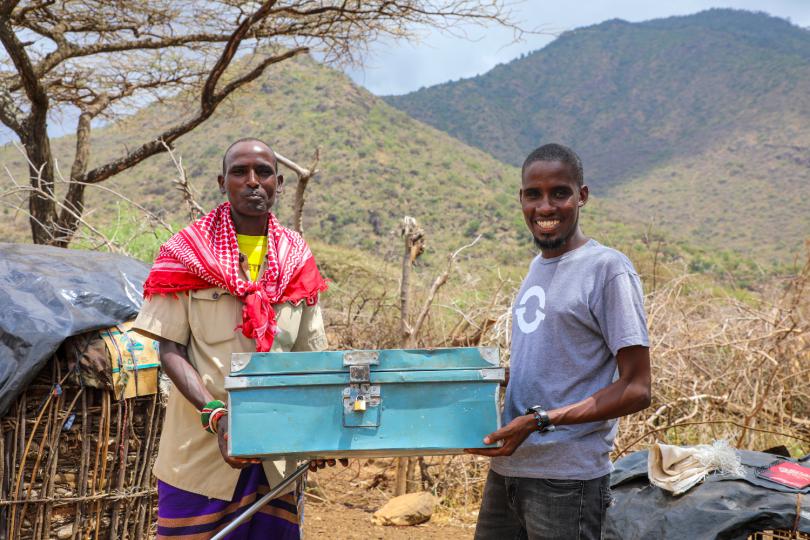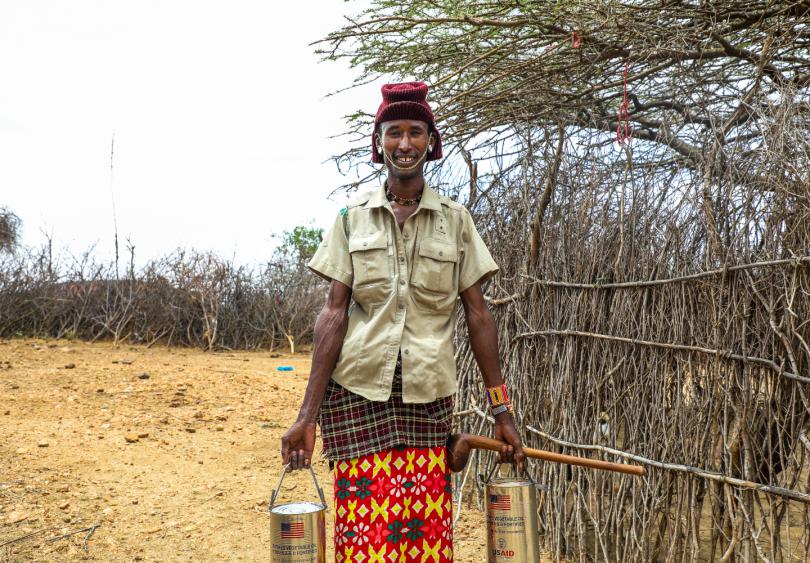HERDERS TURNED ENTREPRENEURS: THE TRANSFORMATIVE JOURNEY OF SAMBURU'S MORANS

Lemayian holding his honey harvest in the company of fellow Morans. Photo Courtesy|Dorothy, Waweru, Save the Children
By Lesuuda Lmeriai
Deep in the heart of Samburu County, we meet a group of Morans known as Kokito, in total they are 21. A hearty conversation reveals that this group was formed in 2022 after the USAID Nawiri project set base in their community. An interesting fact is that these Moran men have never gone to school therefore when they heard that the Nawiri programme would help them to learn, they jumped onto the idea of forming a group.
Wilson who is their mentor says that since Morans are herders finding time to have them all gather is challenging. To this effect, they decided to meet every Saturday evening under a tree for two hours to learn how to read and write. He adds that the group of men also learn how to interact with community members, life skills, and taking care of their health.
“Morans do not believe in going to the hospital. Often, when one gets sick, they prefer using medicated herbs. In addition, their nutrition status and hygiene practices were not very good. Therefore, through Community Health Promoters the Morans have learnt about taking health and hygiene seriously,” says Wilson.
Apart from the lessons they have received such as importance of a balances diet and being aware of their nutrition status, they also received life skills training. Members of this Moran group know how to make shoes and metal boxes which they sell to earn a living and to get food. From the money they earn they have also been taught the importance of loaning and savings, a matter they and other community members including women, girls and men had little knowledge on. Every time they meet each member contributes Ksh. 120 and if one takes a loan they are required to pay it back with a 10% interest.

Wilson and Lesuuda, Health & Nutrition Coordinator, USAID Nawiri, holding a metal box made by the morans. Photo Courtesy|Dorothy Waweru, Save the Children
In addition to the training they have received, they were also taught beekeeping and this has become another source of income. On this particular day, Lemayian, one of the members of the Moran group has harvested honey and he says that it is worth Ksh. 4,000. In a conversation, he tells us that his life has changed because of the training he received from USAID Nawiri.
“Previously, I used to be involved in petty crime but since I received the training on beekeeping I have become busy in taking care of my hives. As you can see I have just harvested this honey which I am going to sell. Through the group, we also learnt about the importance of a balanced diet such as vegetables, chicken meat, and eggs. Now we as Morans eat eggs and chicken which we thought was just a wild bird. Previously, chicken were kept by women as a source of income through selling them and their eggs but were not considered as fit for consumption. In addition, we have received family mid-upper arm circumference tapes to measure malnutrition in children,” says Lemayian.
The training on how to read and write has become a game changer in the lives of Moarns as Lemayian attests.
“Previously, someone would get a message on their phones but they would not even know what it means because they do not know how to read. Right now I can write my name and even my phone number something I never thought I could do,” says Lemayian.
Wilson says that he would like USAID Nawiri to continue to offer them training in other areas like repairing of water pipes, solarisation, fencing, hairdressing and repairing motorbikes since they are the main mode of transport. An important lesson Wilson thinks needs to be incorporated into the trainings they receive is the peace keeping component.
He says that the young moran men are fond of risky behaviours such as stealing of livestock, which he feels, could be curbed if the project incorporated a component on peace trainings.
“The Morans who are enrolled into the USAID Nawiri Boy group lessons are transformed people and their behaviors exhibit a lot of responsibilities. My worry is now on the young Morans who can sometimes be very daring. Some of them steal amongst themselves causing a disruption to the communities’ peace. It would be great if the Nawiri project could incorporate a peace keeping aspect,” says Wilson.

Lemayian holding the honey he collected. Photo Courtesy|Dorothy Waweru, Save the Children
As dusk sets in, Lemayian shows us the honey he harvested revealing the pride of the outcomes of the beekeeping training which he received. He also tells us that as a group, they also make shoes which they sell to boost their income. He implores that the Nawiri project continues to link them to markets where they can supply the items they make such as shoes and metal boxes to promote the growth of their business.
The Nawiri programme is a flagship initiative funded by the USAID Bureau of Humanitarian Assistance (BHA). It uses a nutrition resilience framework to enhance the ability of individuals and communities to withstand, adapt, and recover from challenges or shocks related to nutrition.




